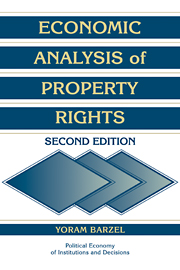Book contents
- Frontmatter
- Contents
- Series editors' preface
- Preface to the second edition
- Preface to the first edition
- Introduction
- 1 The property rights model
- 2 The public domain: Rationing by waiting and price controls
- 3 Contract choice: The tenancy contract
- 4 Divided ownership
- 5 The old firm and the new organization
- 6 The formation of rights
- 7 Slavery
- 8 Wealth-maximizing constraints on property rights
- 9 Property rights and non-market allocation
- 10 Additional property rights applications
- 11 The property rights model: Recapitulation
- References
- Index
11 - The property rights model: Recapitulation
Published online by Cambridge University Press: 05 June 2012
- Frontmatter
- Contents
- Series editors' preface
- Preface to the second edition
- Preface to the first edition
- Introduction
- 1 The property rights model
- 2 The public domain: Rationing by waiting and price controls
- 3 Contract choice: The tenancy contract
- 4 Divided ownership
- 5 The old firm and the new organization
- 6 The formation of rights
- 7 Slavery
- 8 Wealth-maximizing constraints on property rights
- 9 Property rights and non-market allocation
- 10 Additional property rights applications
- 11 The property rights model: Recapitulation
- References
- Index
Summary
People have discretion over how to delineate rights, and as part of their maximization effort they do so to whatever degree they desire. Rights are never perfectly delineated, however, because the fact that commodities are not uniform and are expensive to measure makes perfect delineation prohibitively costly. Nevertheless, since people do what they deem “best,” rights may be said to be always well delineated.
Those properties that people choose not to delineate are in the public domain. Such properties include much of the world's oceans; they also include the cool air in air-conditioned shopping malls, which is not charged for on the margin. Properties in the public domain can be augmented or diminished. As the values of commodities and of commodity attributes change, and as the costs of delineation and of protection change, people's decisions regarding what to leave in, what to relinquish, and what to reclaim from the public domain change correspondingly.
The public domain is ubiquitous; innumerable commodity attributes are placed in it. Any service not fully charged for on the margin is at least partly relinquished to the public domain. Owners could charge for such services, but the extra returns often do not justify the extra costs. For instance, concert-hall owners relinquish to the public domain the differential in valuation among equally priced seats. When the value of concert-hall seats falls – which might happen when the hall is used by a local choir rather than a famous opera star – seats are expected to be priced in lesser detail.
- Type
- Chapter
- Information
- Economic Analysis of Property Rights , pp. 148 - 153Publisher: Cambridge University PressPrint publication year: 1997

